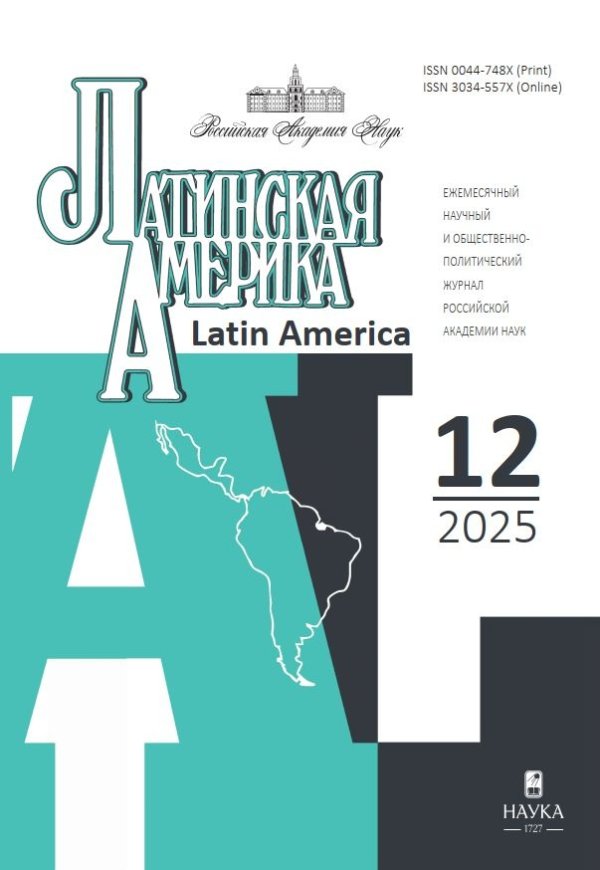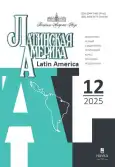Латинская Америка
Ежемесячный рецензируемый научный и общественно-политический журнал РАН.
Основан в 1969 г.
Свидетельство о регистрации СМИ: № 0110358 от 02.03.1993
Учредители
- Российская академия наук
- ИЛА РАН
Издатель
- Российская академия наук
119991, г. Москва, Ленинский пр., 14.
Издается под руководством Отделения глобальных проблем и международных отношений РАН.
О журнале
Журнал «Латинская Америка»:
-
уникальное для России и СНГ полноценное мультидисциплинарное профессиональное издание на русском языке, анализирующее актуальные теоретические и научно-практические проблемы Иберо-Америки;
-
дает читателям широкую панораму иберо-американского мира, печатает эксклюзивные интервью глав государств, министров, политиков, дипломатов, парламентариев и общественных деятелей, видных представителей науки, бизнеса, культуры и искусства, произведения всемирно известных писателей Латинской Америки, Испании и Португалии;
-
включен в Российский индекс научного цитирования (РИНЦ);
-
входит в перечень рецензируемых изданий, которые рекомендованы ВАК для опубликования работ соискателей научных степеней:
5.2.5. Мировая экономика (экономические науки),
5.5.2. Политические институты, процессы, технологии (политические науки),
5.5.4. Международные отношения (политические науки),
5.6.2. Всеобщая история (исторические науки),
5.6.4. Этнология, антропология и этнография (исторические науки),
5.6.7. История международных отношений и внешней политики (исторические науки)
- включен в Russian Science Citation Index (RSCI);
- распространяется в России и за рубежом среди ученых, преподавателей и студентов высших учебных заведений, а также работников внешнеполитических ведомств, парламентариев и представителей деловых кругов.
На страницах журнала
- Политика
- Экономика
- Социальные проблемы
- Страницы истории
- Международные отношения
- Иберийский аспект
- Культура
- Искусство и литература
- Рецензии на новые издания
Авторами нашего издания являются ведущие ученые ИЛА РАН; исследователи из других российских академических и неакадемических НИИ международного профиля; отраслевые аналитики; преподаватели профильных вузов и аспиранты; зарубежные исследователи.
Наша читательская аудитория — это исследователи-международники: экономисты, политологи, социологи, культурологи, историки; преподаватели, аспиранты и студенты профильных вузов; руководители и сотрудники федеральных и региональных органов государственной власти.
Избранные статьи


Текущий выпуск
№ 12 (2025)
Экономика
Центрально-Западный район как феномен регионального развития Бразилии
Аннотация
Центрально-Западный район Бразилии сформировался во второй половине ХХ в., когда столицей страны стал город Бразилиа, выстроенный на пустовавших до этого землях. Нынешняя специализация района связана с освоением саванн и развитием аграрно-промышленного комплекса, сопоставимым с кампаниями сельскохозяйственной колонизации в США, Аргентине, Российской империи и СССР. Сегодня часть территории Бразилии утратила черты фронтира (зоны пионерного освоения), став периферией Юга и Юго-Востока. Одновременно процесс аграрной колонизации распространился на Амазонию и Северо-Восток.
 6-24
6-24


Международные отношения
Азиатская миграция в Латинскую Америку: модели мобильности в эпоху парусных судов
Аннотация
В статье рассматриваются особенности транстихоокеанской миграции, когда мобильность осуществлялась с помощью парусных судов. Манильские галеоны стали ключевым элементом товарного обмена в колониальный период и символом двусторонней связи между Новой Испанией и Филиппинами. В XVI-XVII вв. азиатская миграция выражалась в работорговле, но запрет рабства «индио-чино» в 1672 г. ограничил эту форму трафика. С завоеванием независимости латиноамериканские государства столкнулись с нехваткой рабочих рук. На примере Перу рассмотрены особенности трансформации транстихоокеанского транспортного сообщения, количественная динамика ввоза законтрактованных работников – китайских кули, условия их труда. Сделан вывод о том, что феномен кули был переходной формой трудовых отношений на плантациях, который завершился одновременно с закатом эпохи парусников как доминирующей формой трансокеанского сообщения.
 25-40
25-40


Межкультурная интеграция и адаптация преподавания русского языка в странах Латинской Америки (Республике Куба, Боливарианской Республике Венесуэла, Республике Никарагуа)
Аннотация
Цель
Спроектировать модель межкультурной интеграции и адаптации преподавания русского языка в трех странах Латинской Америки: Республике Куба, Боливарианской Республике Венесуэла, Республике Никарагуа.
Методы
В работе используется такой метод исследования системы, как структурный анализ, позволяющий определить структуру системы, включая ее элементы и их взаимодействие.
Результаты
Проведен краткий ретроспективный анализ ситуации с изучением русского языка в трех странах Латинской Америки: Республике Куба, Боливарианской Республике Венесуэла, Республике Никарагуа. Предлагаемая авторами статьи модель включает четыре взаимосвязанных блока: ценностный, структурный, процессуальный и методический. Представлено содержание этих блоков. Ценностный блок определяет общественные и личностные ценности, исходя из которых у обучающегося формируется его ценностная ориентация. Она в свою очередь определяет мотивацию обучающегося. В структурном блоке рассматриваются существующие властные и образовательные структуры, а также связи между ними, которые способствуют процессам межкультурной интеграции и адаптации преподавания русского языка в указанных странах. Все исследуемые процессы подразделяются на процессы управления и развития, основные процессы и вспомогательные процессы. Авторы полагают, что в методике обучения русскому языку как иностранному должен использоваться лингвокультурологический подход. Компетенция, сформированная в результате такого обучения будет иметь четыре составляющие: лингвистическую, этнокультурную, семиотическую и аксиологическую.
Выводы
Проведенный авторами анализ научных работ показал, что проблематика межкультурной интеграции и адаптации преподавания русского языка с учетом современного образовательного контекста стран Латинской Америки разработана недостаточно и нуждается в дополнительном исследовании.
Предлагаемая авторами концептуальная модель поможет определить содержание и формы методического сопровождения подготовки преподавателей русского языка в указанных государствах Латинской Америки.
 41-54
41-54


Страницы истории
Влияние модерных форм военной организации на формирование региональной идентичности в шт. Юкатан в 1847–1853 гг.
Аннотация
Статья посвящена попытке теоретического осмысления проблемы воздействия новых форм военной организации (мобилизационной призывной армии) на формирование региональной идентичности в латиноамериканском контексте. Штат Юкатан, в силу своей изолированности и масштабов Войны Каст, социального конфликта, охватившего период с 1847 по 1901 гг., стал своеобразной военно-социальной лабораторией, в которой стало возможным как применение новых принципов войны, так и выявление их влияния на самоидентификацию отдельных групп граждан и общества в целом.
 55-63
55-63


Конкурс молодых ученых
Стратегическое партнерство Барбадоса со странами Глобального Юга: мотивации, механизмы и перспективы для региональной и международной политики.
Аннотация
В статье рассматривается внешняя политика Барбадоса как малой островной державы, активно выстраивающей сотрудничество со странами Глобального Юга. Подчёркиваются ключевые направления такие как экологическая повестка, участие в механизмах Юг–Юг и реформирование международных финансовых институтов. Особое внимание уделено инициативам премьер-министра Мии Моттли, включая «Бриджтаунскую инициативу»; значению женского лидерства и дипломатии малых государств в продвижении глобальной справедливости.
 64-71
64-71


Культура
Веселые «люди ванили», которые летают. Прошлое и настоящее народа тотонаки и его древних памятников
Аннотация
В статье рассматриваются наиболее известные археологические памятники, артефакты и традиции тотонаков как пример синтеза общецивилизационных и уникальных проявлений этой месоамериканской культуры. Важное место отводится анализу судьбы наследия тотонаков в современных условиях. Автор отмечает усиление темпов и объемов археологических исследований, указывает на важность и актуальность вопросов, регулирующих правовые аспекты интересов науки и коренных жителей. В статье также представлены различные формы использования памятников культуры в учебных, туристических, коммерческих и развлекательных целях. Отмечается беспокойство мексиканских ученых тенденцией превращения археологических объектов в элементы Диснейленда.
 72-83
72-83


Научная жизнь
Очередной праздник ибероамериканистики на берегах Невы
Аннотация
Вот уже почти четверть века северная столица России принимает в стенах Санкт-Петербургского государственного университета цвет российской и зарубежной ибероамериканистики. Время идет вперед, меняется тематика, варьируются формы мероприятий, но одно остается неизменным: интерес к участию в самой масштабной встрече исследователей ибероамериканского мира — Международном форуме «Россия и Иберо-Америка в турбулентном мире: от общих вызовов к совместным решениям». 900 спикеров из 30 стран, многочисленные магистральные конференции, тематические секции, круглые столы, отражающие ключевые проблемы современной ибероамериканистики. Постоянно растущий интерес молодежи к исследовательской работе в сфере ибероамериканистики — еще один важный аспект данного мероприятия.
 84-91
84-91


Размышляя о прочитанном
«Глашатай свободы», или феномен Хавьера Милея
Аннотация
В представленной ниже рецензии рассматривается монография Филипа Багуса, профессора Университета короля Хуана Карлоса в Мадриде, посвященная жизни, политэкономической философии и вхождению во власть нынешнего президента Аргентины Хавьера Милея. В монографии приведен обзор экономической политики Аргентины за последние 50 лет и обоснованы основные положения идеологии либертарианизма, которую Х.Милей намеревается положить в основу обещанного им «экономического чуда». В рецензии анализируются некоторые детали этой идеологии, позволяющие судить о перспективах развития современной Аргентины.
 92-98
92-98


Цена небрежности и ошибок. Новая история мексиканских коммунистов
Аннотация
В представленном ниже материале анализируется содержание книги воспоминаний видного деятеля Мексиканской коммунистической партии Родольфо Эчеверрии Мартинеса. Оценки, сделанные автором мемуаров, свидетельствуют о принципиально новом подходе к пониманию ряда ключевых эпизодов сложной истории компартии Мексики. В рецензии показана значимость данных мемуаров для обновления историографии, посвященной истории левого движения Мексики.
 99-104
99-104











